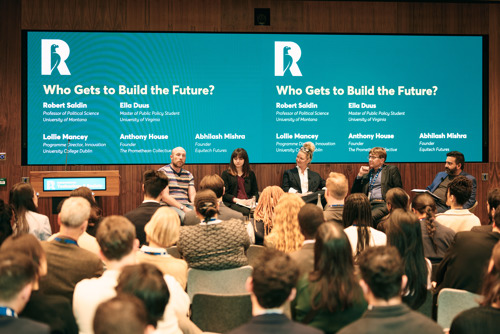Abundance is not just an economic or technological goal, but also a moral and civic challenge that requires serious exploration: how should we create systems where prosperity is broadly shared and the right to shape the future extends to all? Moderated by Abhilash Mishra (India & Merton 2008), Founder of Equitech Futures, the plenary session “Who Gets to Build the Future? Power, Governance & the Politics of Abundance” brought together an interdisciplinary panel of thinkers, technologists, and policy experts to explore the promise and politics of “abundance” — the idea that societies can and should build a future of shared prosperity through innovation, inclusion, and collective action.

Mishra opened the discussion by recounting a story from his Chicago neighborhood: despite residents’ progressive ideals, many opposed affordable housing being built nearby. “The reason we do not have abundant things like housing,” he said, “is not because we lack technology or resources. It’s because we suffer from a failure of collective action — and a failure of imagination.”
Robert Saldin, Professor of Political Science at the University of Montana and Fellow at the Niskanen Center, traced the roots of the abundance agenda to debates in the United States popularized by journalists Ezra Klein and Derek Thompson. He argued that many well-intentioned regulatory reforms of the 1960s and 70s now hinder governments from building critical infrastructure. “The real point is to unshackle government,” Saldin said. “Abundance is not about tearing institutions down — it’s about rebuilding them so they can act.”
Lollie Mancey, anthropologist in innovation at University College Dublin, described how storytelling and public imagination can drive social change. Through the Futureville Ireland project, Mancey’s team invited Irish citizens to envision their communities in 2050 — combining public consultation, scientific research, and augmented reality to help people “see” possible futures. “When people can picture abundance,” she said, “they begin to believe it’s possible.”
Representing a Gen-Z perspective, Ella Duus, RISE Fellow and student of computer science and public policy at the University of Virginia, explored why young people often find the abundance narrative unconvincing. “Gen Z grew up in a world where information and consumption are abundant,” she said. “Degrowth appeals because it feels morally grounded and realistic.” She argued that the abundance movement must address meaningful issues and present more concrete ideas if it hopes to engage the next generation.
Anthony House, a former Google executive and Founder of The Promethean Collective, discussed how civil society can adapt to rapid technological change. He based his insights on lessons from history, urging to “re-humanize the machine” by strengthening institutions that help communities articulate and defend their values.
“Technology will keep advancing,” he said. “The only thing we can control is how our institutions evolve to bridge the gap between our Paleolithic emotions and our modern tools.”
During the audience discussion, participants examined the complex intersections between the abundance agenda, colonial legacies, populism, and other structural forces shaping society today. While abundance is often framed through the language of collective action, it cannot be disentangled from questions of power structure. “We must recognize where abundance has come from — and who has been excluded from it,” Mishra noted.
“Abundance begins when people talk to each other — not just when they build things.” True abundance emerges not from technological progress alone but from the relationships and trust that sustain collective effort. It depends on societies’ ability to listen across differences, share power, and design systems that make participation possible for all. Only then can innovation translate into inclusion — and growth into genuine human flourishing.
